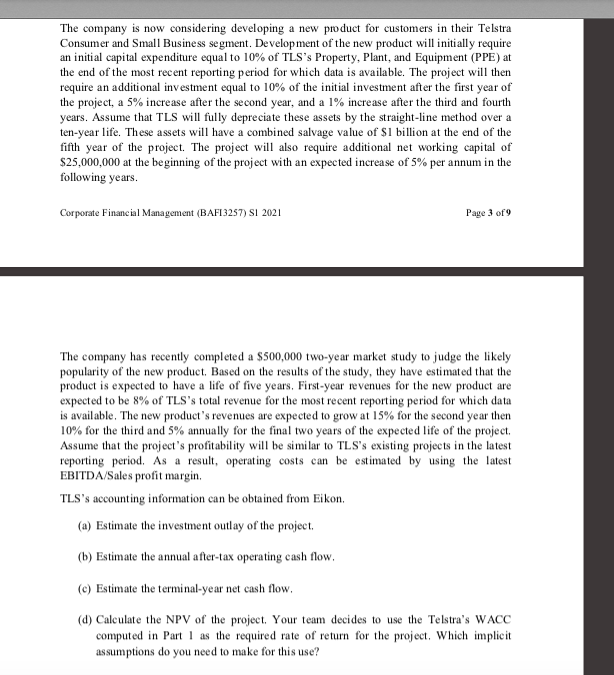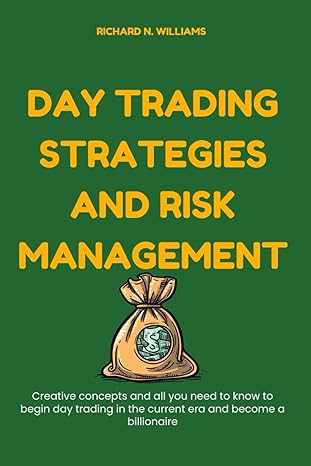
The company is now considering developing a new product for customers in their Telstra Consumer and Small Business segment. Development of the new product will initially require an initial capital expenditure equal to 10% of TLS's Property, Plant, and Equipment (PPE) at the end of the most recent reporting period for which data is available. The project will then require an additional investment equal to 10% of the initial investment after the first year of the project, a 5% increase after the second year, and a 1% increase after the third and fourth years. Assume that TLS will fully depreciate these assets by the straight-line method over a ten-year life. These assets will have a combined salvage value of $1 billion at the end of the fifth year of the project. The project will also require additional net working capital of $25,000,000 at the beginning of the project with an expected increase of 5% per annum in the following years. Corporate Financial Management (BAFI3257) S1 2021 Page 3 of 9 The company has recently completed a $500,000 two-year market study to judge the likely popularity of the new product. Based on the results of the study, they have estimated that the product is expected to have a life of five years. First-year revenues for the new product are expected to be 8% of TLS's total revenue for the most recent reporting period for which data is available. The new product's revenues are expected to grow at 15% for the second year then 10% for the third and 5% annually for the final two years of the expected life of the project. Assume that the project's profitability will be similar to TL S's existing projects in the latest reporting period. As a result, operating costs can be estimated by using the latest EBITDA/Sales profit margin, TLS's accounting information can be obtained from Eikon. (a) Estimate the investment outlay of the project, (b) Estimate the annual after-tax operating cash flow, (e) Estimate the terminal-year net cash flow, (d) Calculate the NPV of the project. Your team decides to use the Telstra's WACC computed in Part 1 as the required rate of return for the project. Which implicit assumptions do you need to make for this use? The company is now considering developing a new product for customers in their Telstra Consumer and Small Business segment. Development of the new product will initially require an initial capital expenditure equal to 10% of TLS's Property, Plant, and Equipment (PPE) at the end of the most recent reporting period for which data is available. The project will then require an additional investment equal to 10% of the initial investment after the first year of the project, a 5% increase after the second year, and a 1% increase after the third and fourth years. Assume that TLS will fully depreciate these assets by the straight-line method over a ten-year life. These assets will have a combined salvage value of $1 billion at the end of the fifth year of the project. The project will also require additional net working capital of $25,000,000 at the beginning of the project with an expected increase of 5% per annum in the following years. Corporate Financial Management (BAFI3257) S1 2021 Page 3 of 9 The company has recently completed a $500,000 two-year market study to judge the likely popularity of the new product. Based on the results of the study, they have estimated that the product is expected to have a life of five years. First-year revenues for the new product are expected to be 8% of TLS's total revenue for the most recent reporting period for which data is available. The new product's revenues are expected to grow at 15% for the second year then 10% for the third and 5% annually for the final two years of the expected life of the project. Assume that the project's profitability will be similar to TL S's existing projects in the latest reporting period. As a result, operating costs can be estimated by using the latest EBITDA/Sales profit margin, TLS's accounting information can be obtained from Eikon. (a) Estimate the investment outlay of the project, (b) Estimate the annual after-tax operating cash flow, (e) Estimate the terminal-year net cash flow, (d) Calculate the NPV of the project. Your team decides to use the Telstra's WACC computed in Part 1 as the required rate of return for the project. Which implicit assumptions do you need to make for this use







